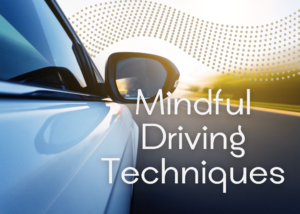
Driving can be an empowering experience, offering freedom, mobility, and independence. However, for many drivers—especially those with disabilities—the act of driving can also bring anxiety and stress. Whether it’s the pressure of navigating busy streets, managing unexpected challenges, or simply the demands of staying focused on the road, driving can sometimes feel overwhelming. Fortunately, mindfulness practices and stress-reduction techniques can play a crucial role in enhancing mental well-being and reducing driving-related anxiety. In this blog we will explore how disabled drivers can incorporate these practices into their routine to foster a calmer, more confident driving experience.
The Importance of Mindfulness in Driving
Mindfulness is the practice of being fully present in the moment, aware of your surroundings, thoughts, and emotions without judgment. When applied to driving, mindfulness can help drivers stay focused, reduce stress, and make more deliberate decisions on the road. For disabled drivers, who may already be navigating additional challenges, mindfulness can be particularly beneficial in maintaining a sense of calm and control.
Key Benefits of Mindfulness for Drivers:
- Enhanced Focus: Staying present allows drivers to concentrate on the road, reducing distractions and the risk of accidents.
- Reduced Anxiety: Mindfulness helps in managing anxiety by keeping the mind from wandering to worst-case scenarios or unnecessary worries.
- Improved Emotional Regulation: Being mindful allows drivers to recognize and manage their emotions, preventing stress or frustration from escalating into road rage or panic.
Mindfulness Techniques for Drivers
Here are some practical mindfulness techniques that can be easily incorporated into the driving routine:
Deep Breathing Exercises
- Before starting the car, take a moment to practice deep breathing. Inhale slowly through your nose, hold the breath for a few seconds, and then exhale slowly through your mouth. This simple exercise can help calm the nervous system and set a peaceful tone for the drive ahead.
- During the Drive: If you find yourself feeling tense or anxious while driving, take a few deep breaths to reset your focus and ease stress.
Body Awareness
- Pay attention to how your body feels as you drive. Notice the sensation of your hands on the steering wheel, your feet on the pedals, and your back against the seat. This awareness can help ground you in the present moment, reducing feelings of anxiety.
- Tip: If you feel tension building in your shoulders or neck, consciously relax these areas to prevent stress from accumulating.
Mindful Listening
- Instead of letting your mind race with worries or distractions, try focusing on the sounds around you. This could be the hum of the engine, the rhythm of your breath, or the music playing softly on the radio. Mindful listening can help anchor your attention and reduce mental clutter.
- Tip: Choose soothing or familiar music that promotes relaxation while driving, but avoid anything too engaging or distracting.
Progressive Muscle Relaxation
- At a stoplight or before starting your journey, practice progressive muscle relaxation. Start by tensing and then relaxing different muscle groups in your body, beginning with your toes and working your way up to your head. This technique can help release physical tension and promote a sense of calm.
- Tip: Focus on your breath as you relax each muscle group, allowing any residual stress to dissipate.
Visualization
- Visualize a positive and calm driving experience before you start your car. Imagine yourself driving confidently and safely, with all the challenges of the road handled smoothly. Visualization can help set a positive mindset and reduce pre-driving anxiety.
- Tip: If you encounter a stressful situation while driving, briefly pull over (if safe) and visualize the outcome you want to achieve. This can help you regain composure and continue driving with confidence.
Incorporating Stress-Reduction Techniques
In addition to mindfulness, several stress-reduction techniques can be particularly beneficial for drivers, especially those dealing with the added pressures of driving with a disability:
Pre-Drive Preparation
Preparing for a drive can reduce anxiety. This might include planning your route ahead of time, checking traffic conditions, and ensuring your vehicle is in good condition. Knowing that you’ve taken steps to prepare can help ease stress.
Scheduled Breaks
Long drives can be particularly taxing. Schedule regular breaks to stretch, move around, and relax. This can help prevent fatigue and reduce stress during extended trips.
Mental Rehearsal
If you’re worried about a specific aspect of driving—such as navigating through heavy traffic—practice mental rehearsal. Imagine yourself successfully handling the situation, focusing on the steps you would take and the positive outcome.
Mindful Affirmations
Use positive affirmations to boost your confidence before and during your drive. Phrases like “I am a calm and capable driver” or “I handle challenges with ease” can reinforce a positive mindset.
Post-Drive Reflection
After completing a drive, take a moment to reflect on the experience. Acknowledge any stress or anxiety you felt, and consider what techniques helped you manage it. This reflection can help you continue improving your mindfulness and stress-reduction practices.
Conclusion: Embracing Mindfulness for a Better Driving Experience
Driving doesn’t have to be a source of stress or anxiety. By incorporating mindfulness practices and stress-reduction techniques, disabled drivers can enhance their mental well-being and enjoy a more relaxed, confident driving experience. Whether it’s through deep breathing, body awareness, or positive visualization, these simple strategies can make a significant difference in how you approach the road.
At Driving to Independence, we are here to support you on this journey. Our mission is to help you navigate the challenges of driving with confidence and ease. If you have any questions or need further assistance, please don’t hesitate to reach out to us at (480) 449-3331 or explore our website to contact us directly. Remember, cultivating a mindful driving routine is a continuous process, and with the right guidance and resources, you can maintain your independence and well-being on the road.
